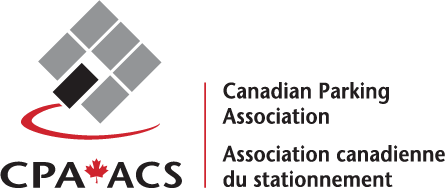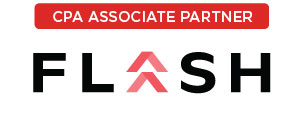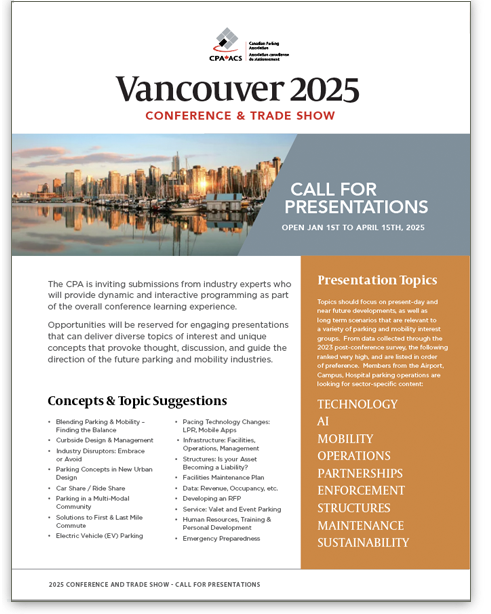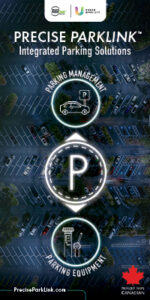Canadian Parking Association New Mission: Being Part of the Mobility Revolution
By Daniele Desjardins
In conjunction with the Canadian Parking Association’s Annual Conference and Trade Show, Parking, the Urban Mobility Perspective, Canada’s 1st Unified Mobility Leadership Summit will be held in Toronto from September 16 to 19, 2018.
The event comes as a result of the long-standing relationship between the Canadian Parking Association (CPA) and the Association for Commuter Transportation of Canada (ACT Canada), the only organization dedicated to sustainable mobility in Canada.
Moreover, the event epitomises the new mission statement adopted unanimously by the CPA Board of Directors at its strategy session held at the start of 2018: Connecting Parking and Mobility Professionals in Canada.
Both organizations’ annual meetings will be held simultaneously under one roof, where delegates are encouraged to take in the shared programming, to underscore the intertwined futures of parking and mobility, and help amplify the CPA’s conference theme.
In 2016, CPA and ACT Canada held concurrent events in Ottawa and shared some sessions and events that were of mutual interest. This year, the partnership between the two organizations has been purposefully strengthened and aligned so that programing is accessible to all delegates. The intent is to position parking as a key component of an overall unified mobility strategy and focus.
The CPA and ACT Canada relationship dates back to 2005, with CPA’s participation on ACT Canada’s National Advisory Team to help identify cross-sector issues that impacted integrated mobility across the country. Back then, a reciprocal agreement was established to formalize the relationship and set up goals to work together collaboratively and develop meaningful synergies, networks and information sharing.
“Since then, the commonalities between the two organizations have evolved not only inwardly, but as a collective undertaking across all transportation and mobility-related sectors. CPA hopes to lead the association market in adapting to new circumstances and delivering to its members all the tools necessary to evolve ahead of the curve,” says Carole Whitehorne, CPA’s Executive Director.
While the educational component of the Parking program will cover some traditional components of the industry, new concepts will be discussed including future use of structures, the impact AV’s and connected vehicles are likely to have on parking, as well as a trade show full of new innovation. The ACT Canada program will focus on Unified Mobility, a new way to describe the positioning and delivery of integrated, connected and seamless transportation options in a community.
As Lorenzo Mele, ACT’s Board Chair, puts it: “Right now, you’ve got customers and they have these different mobility needs, different services they like to tap into, but the services are not necessarily connected – payment platforms, schedules, carshare or bike share applications, etc. – they’re definitely not unified in terms of the customer perspective; the customers have to sort that all out by themselves.” The next layer, he believes, is going to be in partnerships between the many services catering to our mobility needs.1
CPA new mission: leading the trend
Reachel Knight, from the Calgary Parking Authority and a CPA Board member, explains that redefining the mission became an obvious choice as parking and mobility changed with technological advances that brought about new habits and behaviours. Autonomous vehicles (AVs), already a reality in some public transportation systems (like Vancouver’s SkyTrain, the oldest and longest, fully-automated, driverless, rapid-transit system in the world) as well as vehicle sharing – be they cars, bikes or even e-scooters – are poised to become the new mobility, she says.
“Originally, for the last 20 years, our trade shows were all about equipment”, she adds. “Now the focus is on technology: big data, different ways of paying for parking, apps, etc. We (the CPA Directors) made the decision to lead the trend. All sectors of the parking industry – cities, hospitals, universities, private companies – even equipment manufacturers – are experiencing the change. We decided we had to share the message with our members.”
The evolution of parking: not just a place to leave a car
Lorenzo Mele concurs: “What’s interesting about the parking industry itself is that it’s evolved as well, particularly in response to community needs. Parking is a really important component of the transportation system and today, there’s a solid understanding that parking is connected to an overall sustainable mobility strategy. From a public health perspective, a healthy built environment must include parking considerations. Parking has become a whole lot more than where you will put your car each day.”
Parking is an essential part of transportation demand management (TDM), says Mele, and transportation management is all about efficiency. He offers an interesting image to explain TDM: “Just think of all the empty and wasted seats in vehicles that travel the corridors. That’s related to vehicle occupancy. So, if you can improve the vehicle occupancy, you can actually improve the efficiency of the transportation system: how many people are moving through the corridor vs how many automobiles. So that’s the first and fundamental thinking that needs to change: you are moving people, you’re not moving automobiles.”
Expectations about the September joint conference and the ongoing partnership between the two associations are high: “The results are expected to generate increased capacity to evolve parking and sustainable mobility in Canada”, comments Sharon Lewinson, President of ACT Canada. “Moving forward, we see the CPA and ACT partnership include ongoing collaborative efforts, such as joint learning events, best practice information exchange and innovative demonstration projects that showcase cohesive parking and sustainable mobility opportunities.”
This strategic collaboration sets the stage for thought-provoking discussions on the full circle of transportation in urban and rural communities.
Carole Whitehorne agrees with this assessment. “Regardless of the future state of vehicles, whether they are EV, connected or autonomous, parking will remain a key element of a unified mobility future. If our members are wondering what the next steps are to develop their parking operation, this collaboration will provide the perfect opportunity to explore the new frontier with like-minded parking and mobility professionals,” says Whitehorne.
1 For instance, see “Parking Infrastructures and Green Mobility” in Parker Magazine 1st quarter 2018 edition about parking infrastructures going into the carsharing business. https://canadianparking.ca/parking-infrastructures-and-green-mobility/






